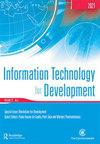ICT4D evaluation: its foci, challenges, gaps, limitations, and possible approaches for improvement
IF 5.1
3区 管理学
Q1 DEVELOPMENT STUDIES
引用次数: 2
Abstract
ABSTRACT With significant cases of failures in information and communication technologies for development (ICT4D or ICTD), much attention has been paid to the importance of evaluation to improve project sustainability. Using the Capability Approach and human development notion as a theoretical lens, this study examines the foci of the ICT4D evaluation, its challenges and gaps, and possible approaches to address the challenges and gaps. The study conducted content analyses of 108 peer-reviewed journal articles and 114 aid/development agency reports, and interviews with 24 researchers in the academic and practitioner spheres. The study finds that the foci of the ICT4D evaluation can be described in terms of areas such as continental/regional focus, method and research design, notion of development, and evaluation focus. Moreover, the study finds that challenges exist surrounding impact assessment, which can be addressed by clarifying the development notion–impact connection in the evaluation process and focusing on the evaluation capacity building (ECB) of project participants. In addition, the study highlights the importance of the domain-based approach in the ICT4D evaluation.ICT4D评价:其重点、挑战、差距、限制和可能的改进方法
随着信息和通信技术促进发展(ICT4D或ICTD)失败的重大案例,人们越来越重视评估对提高项目可持续性的重要性。本研究以能力方法和人类发展概念为理论视角,探讨了ICT4D评估的重点、挑战和差距,以及解决挑战和差距的可能方法。这项研究对108篇同行评议的期刊文章和114份援助/发展机构报告进行了内容分析,并采访了学术和实践领域的24名研究人员。研究发现,ICT4D评价的重点可以从大陆/区域重点、方法和研究设计、发展理念和评价重点等方面进行描述。此外,研究还发现,围绕影响评估存在挑战,可以通过澄清评估过程中的发展概念与影响之间的联系以及关注项目参与者的评估能力建设来解决这些挑战。此外,该研究强调了基于领域的方法在ICT4D评价中的重要性。
本文章由计算机程序翻译,如有差异,请以英文原文为准。
求助全文
约1分钟内获得全文
求助全文
来源期刊

Information Technology for Development
Multiple-
CiteScore
11.30
自引率
16.70%
发文量
34
期刊介绍:
Information Technology for Development , with an established record for publishing quality research and influencing practice, is the first journal to have explicitly addressed global information technology issues and opportunities. It publishes social and technical research on the effects of Information Technology (IT) on economic, social and human development. The objective of the Journal is to provide a forum for policy-makers, practitioners, and academics to discuss strategies and best practices, tools and techniques for ascertaining the effects of IT infrastructures in government, civil societies and the private sector, and theories and frameworks that explain the effects of IT on development. The concept of development relates to social, economic and human outcomes from the implementation of Information and Communication Technology (ICT) tools, technologies, and infrastructures. In addition to being a valuable publication in the field of information systems, Information Technology for Development is also cited in fields such as public administration, economics, and international development and business, and has a particularly large readership in international agencies connected to the Commonwealth Secretariat, United Nations, and World Bank.
 求助内容:
求助内容: 应助结果提醒方式:
应助结果提醒方式:


